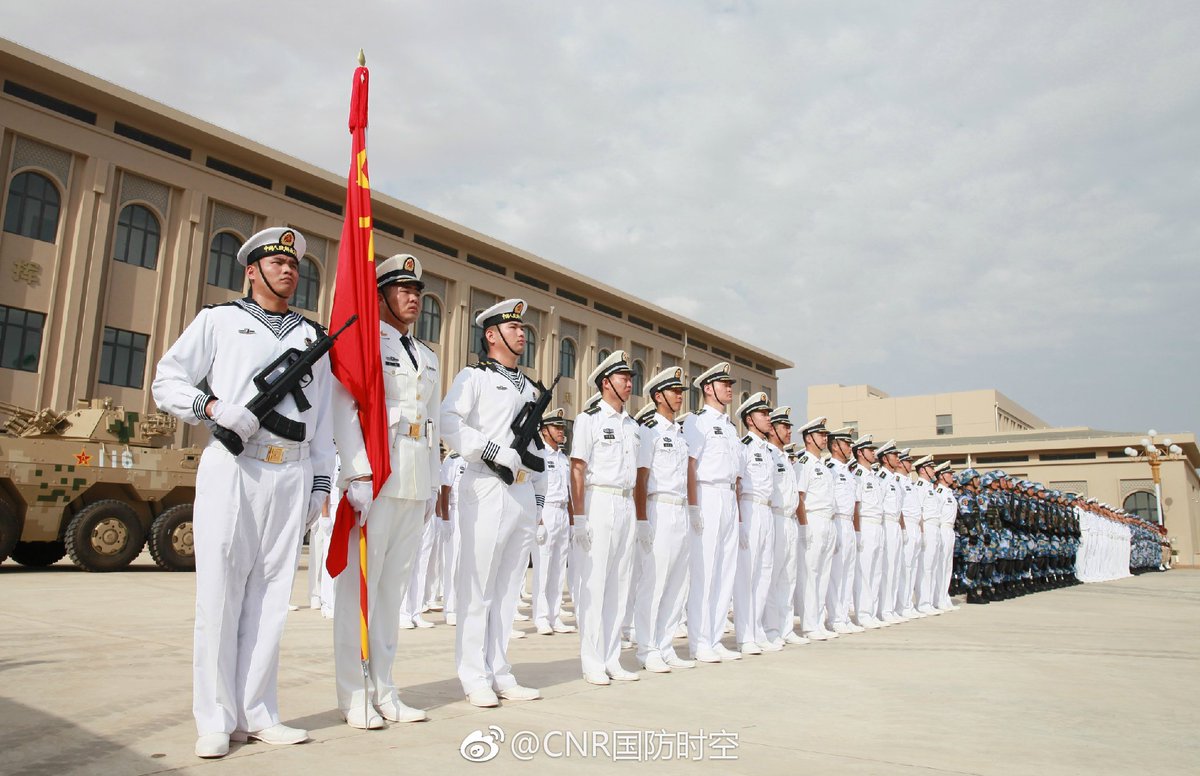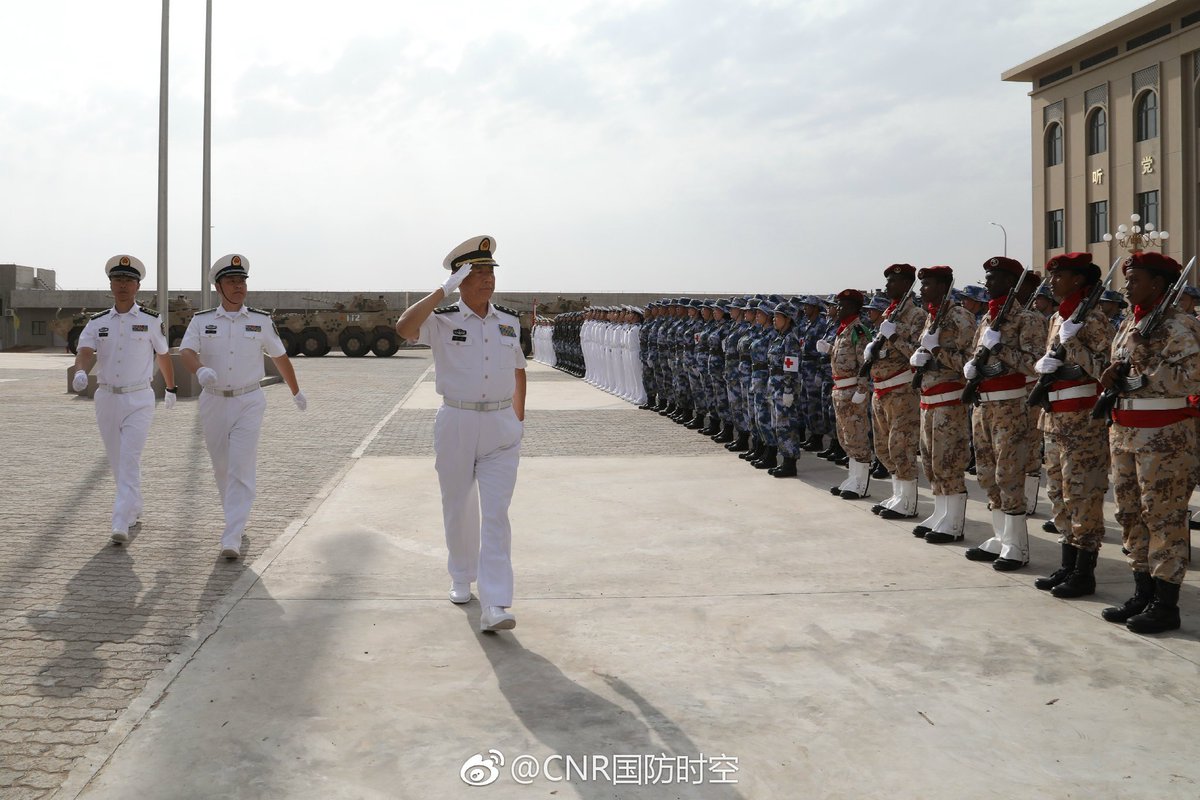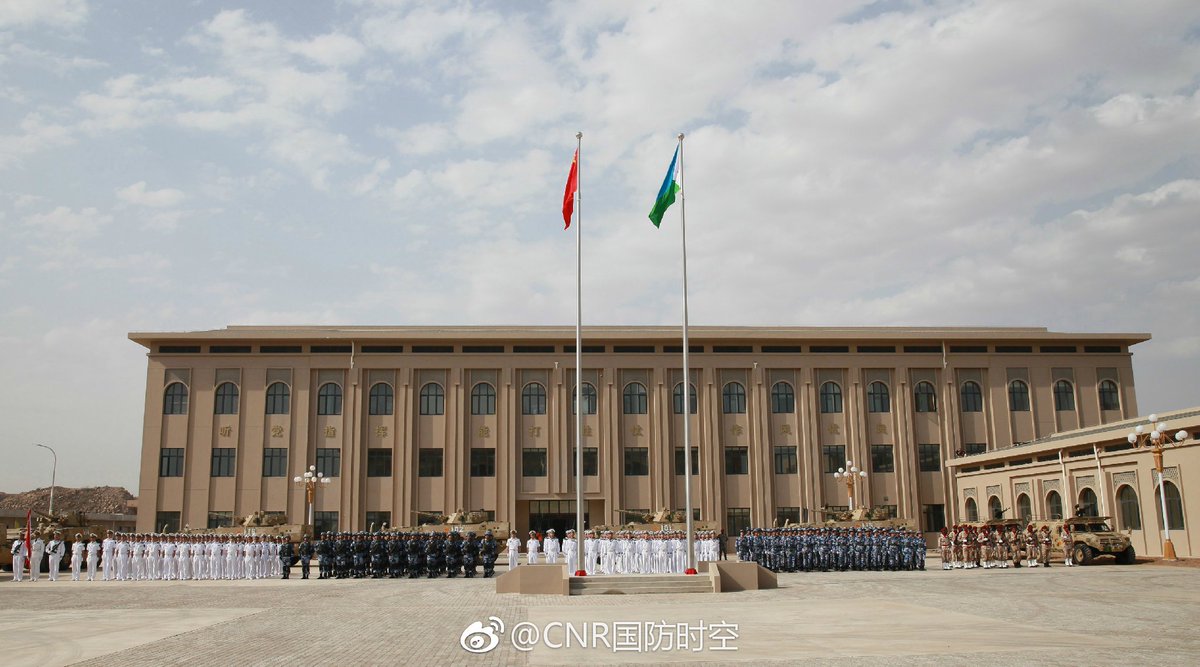Dear friend, the statement is for societies and applicable ''TO WHOEVER PRACTICES IT''
You are using an out of date browser. It may not display this or other websites correctly.
You should upgrade or use an alternative browser.
You should upgrade or use an alternative browser.
Chinese oversea bases
- Thread starter tphuang
- Start date
antiterror13
Brigadier
Japan couldn't do that since 1945, I don't know what 'reinforcement of perception' you're writing about. Your skewed anti-Japanese views for sure.
But that hasn't changed Japanese prestige on international scene one iota. That's a fact.
you meant the fact that Japanese forces take an order from press and the US force?
Hendrik_2000
Lieutenant General
Henri K take on the milestone event of first Chinese base overseas in Africa. soon tobe followed by the 2nd and 3rd where would it be? Any one care to guess?
It is a modest base compare to camp Lemmonier with no air strip.But Pentagon and the western press make is sound like Godzilla
We talked about it almost a year ago, and now it is done - the Chinese army sent this Tuesday July 11 the first troops to its new base located in Djibouti.
A support base, as its official name indicates, and also the first permanent military base abroad for China, which will serve not only to refuel Chinese fleets that provide an uninterrupted presence in the Gulf of Aden since 2009, but also as the country's first major pivot for its One Belt One Road strategy on the African continent.
The first Chinese garrison in Djibouti is officially formed yesterday. Given the amount of equipment to be installed on site, two ships moving more than 20,000 tonnes from the Chinese Navy were mobilized - 999 Jinggangshan , which is one of six Type 071 Landing Shipments (LPD) , And the 868 Donghaidao , a military semi-submersible 175.5 meters long.
It is a modest base compare to camp Lemmonier with no air strip.But Pentagon and the western press make is sound like Godzilla
We talked about it almost a year ago, and now it is done - the Chinese army sent this Tuesday July 11 the first troops to its new base located in Djibouti.
A support base, as its official name indicates, and also the first permanent military base abroad for China, which will serve not only to refuel Chinese fleets that provide an uninterrupted presence in the Gulf of Aden since 2009, but also as the country's first major pivot for its One Belt One Road strategy on the African continent.
The first Chinese garrison in Djibouti is officially formed yesterday. Given the amount of equipment to be installed on site, two ships moving more than 20,000 tonnes from the Chinese Navy were mobilized - 999 Jinggangshan , which is one of six Type 071 Landing Shipments (LPD) , And the 868 Donghaidao , a military semi-submersible 175.5 meters long.
Last edited:
Hendrik_2000
Lieutenant General
(cont)
, though discreet, is presided over by AdmiralSHEN Jin Long (沈金龙), Commander-in-Chief of the Chinese Navy, at the Zhanjiang Naval Base. It is unclear at this time how many Chinese soldiers have been sent, but knowing that a Type 071 LPD can only carry 800 men in addition to its crew, and that the Chinese base in Djibouti measures only 0.36 km², It seems unlikely that the Chinese army will deploy more than one regiment on the spot.
According to Mahamoud Ali Youssouf, the foreign minister of Djibouti, the number of Chinese military present in this future base is not limited, but in principle "it should not exceed 2,000 men".
Chinese warships are allowed to lay anchor there, but there will be no airstrip, only heliports, says Ali Youssouf, which limits the projection capacity of Chinese forces towards the interior of the continent.
In comparison, the Lemonnier camp, the only permanent US military base in Africa, covers an area of 2 km² for a rent of 70 million USD per year. 4,000 US military personnel are on site throughout the year.
In yellow, the Chinese support base in Djibouti, located to the west of Doraleh's new container port.
In comparison, the Lemonier Camp of the US Army in Djibouti.
To have their first "pied-à-terre" overseas, the Chinese government must pay the damned sum of 20 million US dollars a year. The contract, signed between Djibouti and China in 2015, is valid for 10 years but renewable.
In just ten years, China has become the main trading partner of the African continent with more than 160 billion USD of goods traded in 2015. This is twice as much as the United States and almost three times that of France.
The fact that more than one million Chinese live and work in Africa today further strengthens the need for close military support, not to mention the arrival of the global economic-geopolitical strategy "One Belt One Road "Which aims to create two transcontinental economic zones between Asia, Eastern Europe and Africa.
These areas should make it easier for China to supply natural resources for its growth and export its excess production capacity. A scheme that is already known in Europe after the first Industrial Revolution in the early 19th century , but the methods are a different hair.
To support this ambitious strategy established by Chinese President XI Jin Ping, very important means have been put in place. For example, the navigation and positioning system Beidou , the Chinese equivalent of the GPS system , is requested to be able to cover as soon as possible all the countries of this "belt" in Asia.
A belt in which China intends to establish its own rules of the game, and integrate as many people as possible into its sphere of influence through trade, but not only.
Djbouti, along with the South China Sea, the Straits of Malacca and Sri Lanka, is part of the strategic maritime crossings of this new Silk Sea Road.
The choice to build a "supply" base, initially at this location overlooking the mouth of the Gulf of Aden seems logical to respond to a global economic and geopolitical strategy.
So a first step, but most likely not the last ...
To be continued.
Henri K.
, though discreet, is presided over by AdmiralSHEN Jin Long (沈金龙), Commander-in-Chief of the Chinese Navy, at the Zhanjiang Naval Base. It is unclear at this time how many Chinese soldiers have been sent, but knowing that a Type 071 LPD can only carry 800 men in addition to its crew, and that the Chinese base in Djibouti measures only 0.36 km², It seems unlikely that the Chinese army will deploy more than one regiment on the spot.
According to Mahamoud Ali Youssouf, the foreign minister of Djibouti, the number of Chinese military present in this future base is not limited, but in principle "it should not exceed 2,000 men".
Chinese warships are allowed to lay anchor there, but there will be no airstrip, only heliports, says Ali Youssouf, which limits the projection capacity of Chinese forces towards the interior of the continent.
In comparison, the Lemonnier camp, the only permanent US military base in Africa, covers an area of 2 km² for a rent of 70 million USD per year. 4,000 US military personnel are on site throughout the year.
In yellow, the Chinese support base in Djibouti, located to the west of Doraleh's new container port.
In comparison, the Lemonier Camp of the US Army in Djibouti.
To have their first "pied-à-terre" overseas, the Chinese government must pay the damned sum of 20 million US dollars a year. The contract, signed between Djibouti and China in 2015, is valid for 10 years but renewable.
In just ten years, China has become the main trading partner of the African continent with more than 160 billion USD of goods traded in 2015. This is twice as much as the United States and almost three times that of France.
The fact that more than one million Chinese live and work in Africa today further strengthens the need for close military support, not to mention the arrival of the global economic-geopolitical strategy "One Belt One Road "Which aims to create two transcontinental economic zones between Asia, Eastern Europe and Africa.
These areas should make it easier for China to supply natural resources for its growth and export its excess production capacity. A scheme that is already known in Europe after the first Industrial Revolution in the early 19th century , but the methods are a different hair.
To support this ambitious strategy established by Chinese President XI Jin Ping, very important means have been put in place. For example, the navigation and positioning system Beidou , the Chinese equivalent of the GPS system , is requested to be able to cover as soon as possible all the countries of this "belt" in Asia.
A belt in which China intends to establish its own rules of the game, and integrate as many people as possible into its sphere of influence through trade, but not only.
Djbouti, along with the South China Sea, the Straits of Malacca and Sri Lanka, is part of the strategic maritime crossings of this new Silk Sea Road.
The choice to build a "supply" base, initially at this location overlooking the mouth of the Gulf of Aden seems logical to respond to a global economic and geopolitical strategy.
So a first step, but most likely not the last ...
To be continued.
Henri K.
Hendrik_2000
Lieutenant General
The base is done and receive its first occupant
Chinese troops are investing their new base in Djibouti.




China formally opens first overseas military base in Djibouti
2 MIN READ
BEIJING (Reuters) - China formally opened its first overseas military base on Tuesday with a flag raising ceremony in Djibouti in the Horn of Africa, the same day as the People's Liberation Army marks its 90th birthday, state media said.
Djibouti's position on the northwestern edge of the Indian Ocean has fueled worry in India that it would become another of China's "string of pearls" military alliances and assets ringing India, including Bangladesh, Myanmar and Sri Lanka.
China began construction of a logistics base in Djibouti last year. It will be used to resupply navy ships taking part in peacekeeping and humanitarian missions off the coasts of Yemen and Somalia, in particular.
It is China's first overseas naval base, though Beijing officially describes it as a logistics facility.
State radio said more than 300 people attended the ceremony, including deputy Chinese naval commander Tian Zhong and Djibouti's defense minister.
The base will enable China to better support its patrols in waters off Somalia and Yemen and carried out its international humanitarian obligations, the report said.
Chinese President Xi Jinping is overseeing an ambitious military modernization program, including developing capabilities for China's forces to operate far from home.
Djibouti, which is about the size of Wales, is at the southern entrance to the Red Sea on the route to the Suez Canal. The tiny, barren nation sandwiched between Ethiopia, Eritrea and Somalia also hosts U.S., Japanese and French bases.
Ships carrying personnel for the Djibouti base left China last month.
There has been persistent speculation in diplomatic circles that China would build other such bases, in Pakistan for example, but the government has dismissed this.
Reporting by Ben Blanchard; Editing by Michael Perry
Chinese troops are investing their new base in Djibouti.




China formally opens first overseas military base in Djibouti
2 MIN READ
BEIJING (Reuters) - China formally opened its first overseas military base on Tuesday with a flag raising ceremony in Djibouti in the Horn of Africa, the same day as the People's Liberation Army marks its 90th birthday, state media said.
Djibouti's position on the northwestern edge of the Indian Ocean has fueled worry in India that it would become another of China's "string of pearls" military alliances and assets ringing India, including Bangladesh, Myanmar and Sri Lanka.
China began construction of a logistics base in Djibouti last year. It will be used to resupply navy ships taking part in peacekeeping and humanitarian missions off the coasts of Yemen and Somalia, in particular.
It is China's first overseas naval base, though Beijing officially describes it as a logistics facility.
State radio said more than 300 people attended the ceremony, including deputy Chinese naval commander Tian Zhong and Djibouti's defense minister.
The base will enable China to better support its patrols in waters off Somalia and Yemen and carried out its international humanitarian obligations, the report said.
Chinese President Xi Jinping is overseeing an ambitious military modernization program, including developing capabilities for China's forces to operate far from home.
Djibouti, which is about the size of Wales, is at the southern entrance to the Red Sea on the route to the Suez Canal. The tiny, barren nation sandwiched between Ethiopia, Eritrea and Somalia also hosts U.S., Japanese and French bases.
Ships carrying personnel for the Djibouti base left China last month.
There has been persistent speculation in diplomatic circles that China would build other such bases, in Pakistan for example, but the government has dismissed this.
Reporting by Ben Blanchard; Editing by Michael Perry
Last edited:
Hendrik_2000
Lieutenant General
Here is the video of base dedication
An unspecified Japanese naval ship sent frogmen to approach the 2 PLAN vessels in Dijbouti according to prosecutor Jian Jiamin. The incident was reported with evidence to local authorities, and the personnel will start using light and verbal'cues to warn off future intrusions. The time of the incident was unspecified but it is after both ships arrived.
He 'advised' ships to take "necessary measures to stop [the encroachment] or even to exercise its self-defence rights", could this mean other anti-frogmen techniques?
He 'advised' ships to take "necessary measures to stop [the encroachment] or even to exercise its self-defence rights", could this mean other anti-frogmen techniques?
He 'advised' ships to take "necessary measures to stop [the encroachment] or even to exercise its self-defence rights", could this mean other anti-frogmen techniques?
Just throw a grenade into the water






